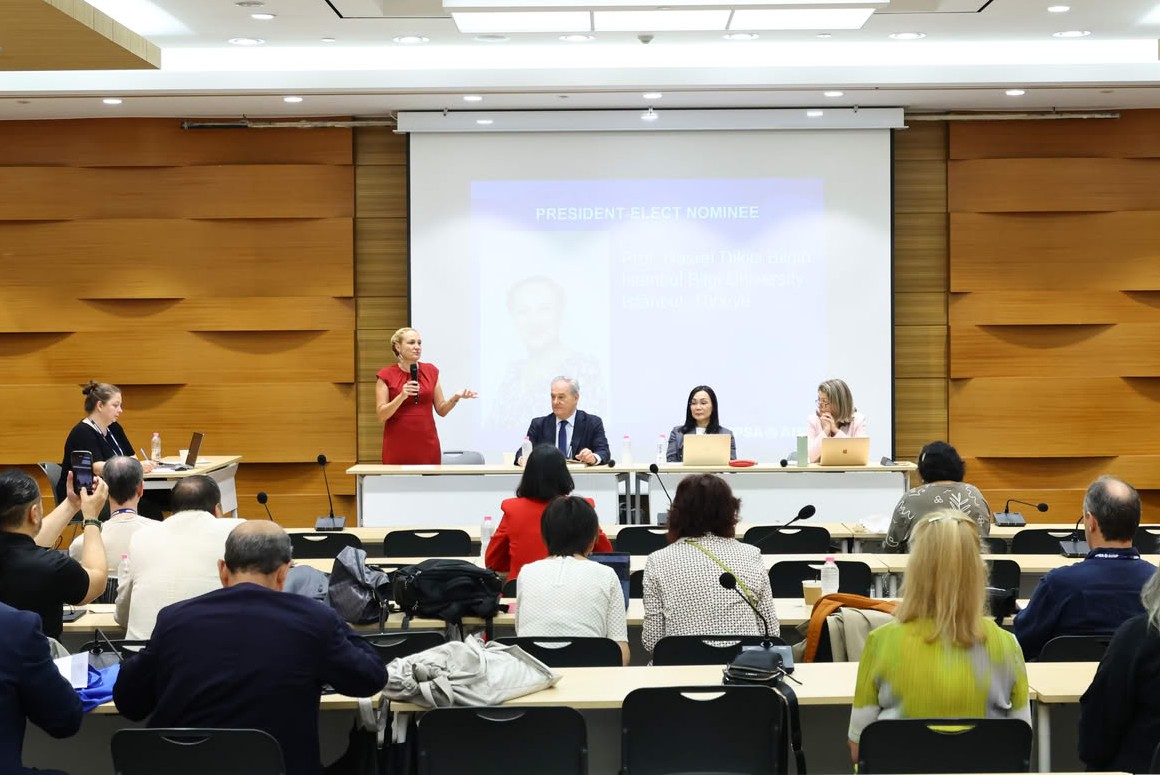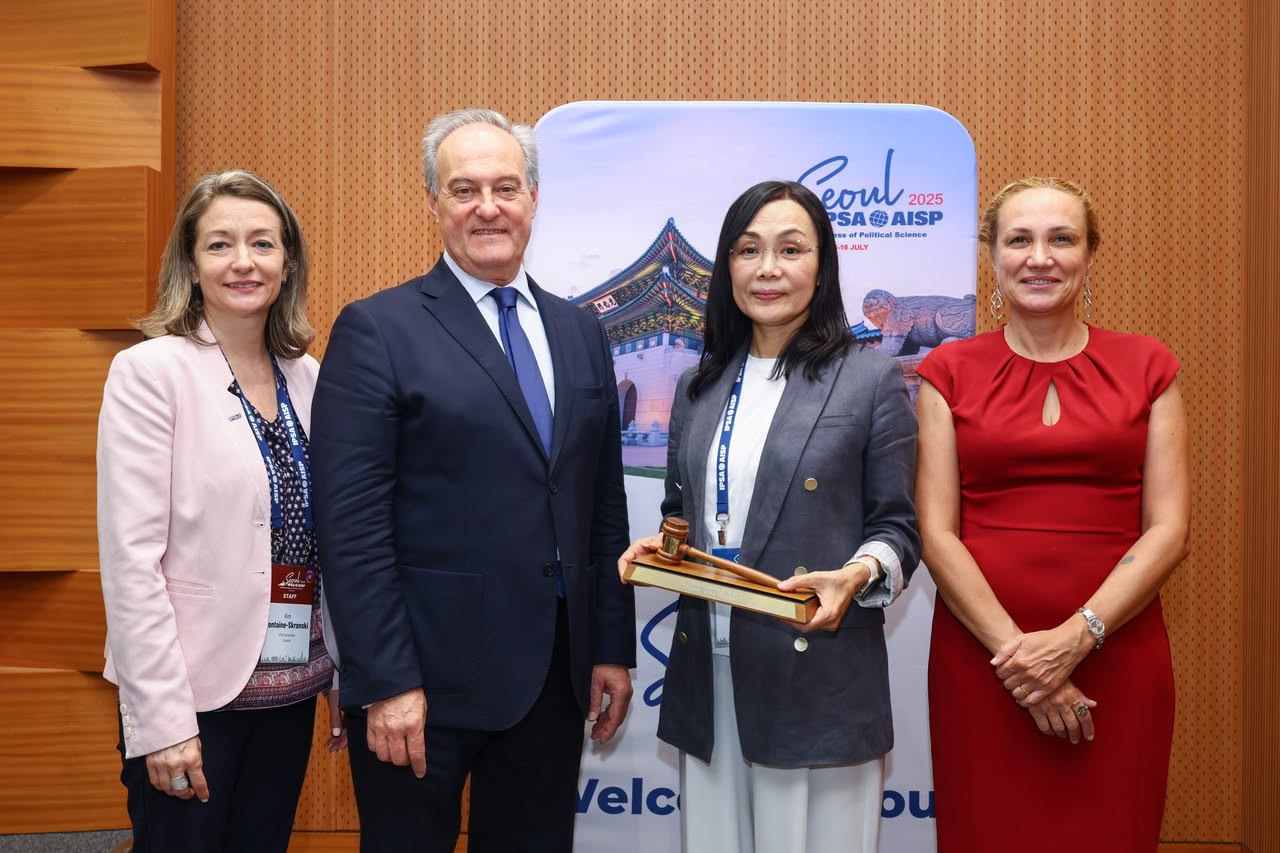

The Council Elects Hasret Dikici Bilgin as IPSA’s President-Elect
Publication date: Tue, 15 Jul 2025
 The IPSA Council, the Association’s highest decision-making body, has elected Hasret Dikici Bilgin (Türkiye) as the new President-Elect on 15 July 2025 at the IPSA World Congress of Political Science in Seoul. Prof. Bilgin will serve a two-year term as President-Elect and is set to assume the presidency at the 2027 IPSA World Congress in Rome.
The IPSA Council, the Association’s highest decision-making body, has elected Hasret Dikici Bilgin (Türkiye) as the new President-Elect on 15 July 2025 at the IPSA World Congress of Political Science in Seoul. Prof. Bilgin will serve a two-year term as President-Elect and is set to assume the presidency at the 2027 IPSA World Congress in Rome.
Photo (left to right): Kim Fontaine-Skronski (IPSA Executive Director), Pablo Oñate (IPSA Past President), Yuko Kasuya (IPSA President) and Hasret Dikici Bilgin (IPSA President-Elect).
Prof. Bilgin is Professor of political science at Istanbul Bilgi University, Türkiye. She currently serves as the Vice-Chair on the executive board of the Turkish Political Science Association. Her research and teaching interests center around comparative political institutions with a specific focus on the pro-Islamist parties and elections in Muslim majority countries. She also studies the interactions between social class and gender within the Islamist movements. She has filled numerous different roles at IPSA since 2013.
In 2018, together with Bertrand Badie, she was appointed as Program Co-Chair for the 2020 IPSA World Congress of Political Science initially scheduled to take place in Lisbon before the COVID-19 pandemic hit and the Congress was transitioned to a fully virtual event in 2021. She served as a member of the IPSA Executive Committee from 2018 to 2021, and again from 2021 to 2023, as the Turkish Political Science Association's representative. She authored and co-authored several articles published in books and peer-reviewed journals, and co-edited a comparative politics textbook in Turkish, which received an award from the Turkish Academy of Sciences in 2014.
We warmly congratulate Prof. Dikici Bilgin on her new position.
Please find below Prof. Dikici Bilgin’s Presidential Mission Statement, presented at the IPSA Council on 15 July 2025.
Dear IPSA Council Members and Colleagues,
I have been an active member of IPSA since 2012 and served in various positions as an IPSA Vice-President, two terms Executive Committee (EC) member, Program Co-Chair, and Summer Schools Coordinator. I would like to express my gratitude to the IPSA community for enhancing my vision and providing me with support during this period.
I was a junior scholar when I became a Local Organizing Committee member and worked in different capacities. The experience I acquired by serving at IPSA has been immense. IPSA appeals to a wide academic community beyond advanced democracies and provides a platform where junior and senior scholars from all over the world, and with diverse interests, come together. It values research from more disadvantaged geographies, academic freedom, diversity, and gender equality. This awareness enabled me to gather a more diverse Executive Committee at the Turkish Political Science Association (SITD) and reorganize our activities accordingly. We channeled our resources to provide incentives for different sections of the academic society at home and amended our regulations to be more inclusive and equalitarian. In addition, my experience on various IPSA committees, including the Executive Committee, World Congress Program Committee, Publications Committee, Committee on Organization, Procedures and Awards (COPA), and the Regional Dialogues initiative, enabled our national association to improve and diversify its activities. IPSA’s tradition of constructive criticism and mutual collaboration enabled our organization to survive the global turmoils and the rising anti-intellectualism. In my capacity as the Vice-President of SITD, I try to implement these principles by encouraging a friendly working environment and including junior researchers and scholars from more disadvantaged communities.
I decided to apply for this position to further contribute to IPSA, which has become a home and school for me for a decade. I have four (but not limited to) goals to transform my experience towards the improvement of the activities and functioning of IPSA.
First, IPSA provides a wide scientific platform for research and collaboration from all over the world. I would like to enhance further academic collaboration between the national associations and the IPSA Research Committees by encouraging joint academic workshops and seminars and highlighting their visibility. I plan to create a working group under the Committee on Research and Training (CRT), which will become a hub for open and upcoming calls of international research and support the formation of research consortiums to apply for comparative and regional research. Universities worldwide are increasingly focusing on research, and given our organization's expertise, IPSA can become an advanced hub for research. We already have several former and current Executive Committee members with state-of-the-art research experience that will help us achieve this goal.
Second, current and former presidents and executive committees have shown great commitment to being inclusive and supporting scholars from the Global South. The European national political science associations have already been active in this area. With the efforts of the current presidency, the Latin American academic community became more engaged with IPSA. IPSA also achieved a higher level of engagement with the Southeast Asian academic community through the location of the next congress and electing presidents from Asia. Currently, two regions, the Middle East and Africa, remain below their capacity to be represented and engage in IPSA activities for economic and political reasons. I intend to enhance IPSA’s Regional Dialogues initiative through online and face-to-face activities with these two regions, which have been suffering from economic difficulties and the narrowing of the political space. In these circumstances, IPSA can provide a lifeline to struggling academic communities by fostering bilateral collaborations and supporting the development of academic networks.
Third, I would like to further support the Research Committees’ (RCs) activities to transform them into wider cross-national collaborations, research, and publications. I would like to devote further communication to the RC liaison in line with my first goal to form research consortiums and build comparative and regional research networks. By integrating the planned working group under the CRT, I intend to highlight the research potential under IPSA.
Finally, I intend to contribute to the collegial and positive working culture at IPSA by being a president and a team member. IPSA has one of the most inclusive and diverse academic communities worldwide, as well as one of the most professional Secretariat structures. Collegiality and collaboration form the basis of this successful administrative and academic composition. I have witnessed the enhancement of ethical values and norms in IPSA through administrative reforms over time. I would like to further create an Equality, Diversity, and Inclusion (EDI) Board with representation from both the academic and administrative components to improve our standing in the international academic community.
During the current and former presidencies, IPSA has benefited from various innovative reforms and new projects. I will continue the ongoing projects and processes with commitment and collegial institutional culture.











